Pattani Province
Pattani (Thai: ปัตตานี, pronounced [pàt.tāː.nīː]; Pattani Malay: ڤطاني, 'ตานิง, pronounced [ˈtːaniŋ]) is one of the southern provinces of Thailand. Neighboring provinces are (from southeast clockwise) Narathiwat, Yala, and Songkhla.
Pattani ปัตตานี (Thai) ڤطاني (Pattani Malay) | |
|---|---|
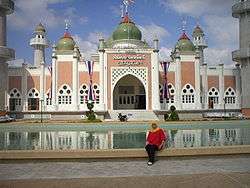 Pattani Grand Mosque | |
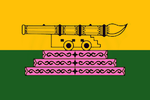 Flag 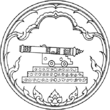 Seal | |
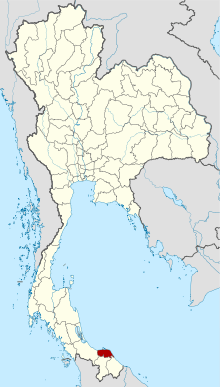 Map of Thailand highlighting Pattani Province | |
| Country | Thailand |
| Capital | Pattani |
| Government | |
| • Governor | Kraisorn Wisistwong (since 2018) |
| Area | |
| • Total | 1,940 km2 (750 sq mi) |
| Area rank | Ranked 68th |
| Population (2018)[2] | |
| • Total | 718,077 |
| • Rank | Ranked 37th |
| • Density | 370/km2 (1,000/sq mi) |
| • Density rank | Ranked 9th |
| Human Achievement Index | |
| • HAI (2017) | 0.4950 "low" Ranked 74th |
| Time zone | UTC+7 (ICT) |
| Postal code | 94xxx |
| Calling code | 073 |
| ISO 3166 code | TH-94 |
| Website | www |
Geography
Pattani is on the Malay Peninsula, with the coast of the Gulf of Thailand to the north. The south is dominated by the Sankalakhiri mountain range, which includes Budo-Su-ngai Padi National Park, on the border with Yala and Narathiwat.
Toponymy
The name Pattani is the Thai adaptation of the Malay name Patani (Jawi: ڤتاني), which can mean "this beach" in Patani Malay language. (In standard Malay, this would be pantai ini.) Another suggestion is that it derives from a Sanskrit word pathini, meaning "virgin nymph"; Pathini was the name of a daughter of Merong Mahawangsa, founder of the preceding Langkasuka Empire.[4]
History
Historically, Pattani Province was the centre of the Malay Sultanate of Patani Darul Makrif. For centuries a tributary state of Siam, Patani has been governed by Siam since its conquest in 1785. Siamese rule was officially acknowledged by the Burney Treaty of 1826 negotiated with the British Empire which included also Kedah, Kelantan, Perlis and Terengganu. Unlike these four sultanates, Patani was not included in the Anglo-Siamese Treaty of 1909 and remained under Siamese rule. Both Yala (Jala) and Narathiwat (Menara) were originally part of Patani, but were made provinces in their own right during the territorial administrative reform and the creation of a united centralized Siam state in the early-20th century.
Demographics
Pattani is one of the four provinces of Thailand where the majority of the population are Muslim, with the other provinces being Yala, Narathiwat, and Satun. In the 2014 census, it is stated that they make up to roughly 88 percent of its population. The strong Muslim presence in this province is partly due to the people being of Malay ancestry, with a large portion of the population being able to speak the Pattani Malay language (though most of them can still speak Thai as well).
Symbols
The seal of the province shows the cannon called Phraya Tani, known as Sri Pattani in Malay, which was cast in Pattani Province. It was brought to Bangkok in 1785, and is now on display in front of the Ministry of Defence in Bangkok.
The provincial flower is the Chinese hibiscus (Hibiscus rosa-sinensis), and the provincial tree the Ironwood (Hopea odorata).
Administrative divisions
Provincial government
Pattani is divided into 12 districts (amphoe), which are further divided into 115 subdistricts (tambon) and 629 villages (muban). The districts of Chana (Malay: Chenok), Thepa (Malay:Tiba) and Saba Yoi (Malay:Sebayu) were detached from Pattani and transferred to Songkhla in 1796 by Siam government.
| Map | Number | Name | Thai | Jawi | Malay |
|---|---|---|---|---|---|
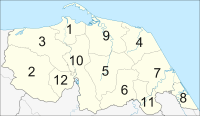 | |||||
| 1 | Mueang Pattani | เมืองปัตตานี | فطاني | Patani | |
| 2 | Khok Pho | โคกโพธิ์ | كوكفور | Kuk Pur | |
| 3 | Nong Chik | หนองจิก | نونغجيك | Nung Chik | |
| 4 | Panare | ปะนาเระ | فناريق | Penarik | |
| 5 | Mayo | มายอ | مايو | Mayu | |
| 6 | Thung Yang Daeng | ทุ่งยางแดง | |||
| 7 | Sai Buri | สายบุรี | سليندونغ بايو ، تلوبن | Selindung Bayu, Teluban | |
| 8 | Mai Kaen | ไม้แก่น | |||
| 9 | Yaring | ยะหริ่ง | جمبو | Jambu, | |
| 10 | Yarang | ยะรัง | يا ليمو | Ya Li hu | |
| 11 | Kapho | กะพ้อ | |||
| 12 | Mae Lan | แม่ลาน |
Local government
As of 26 November 2019 there are[5]: one Pattani Provincial Administration Organisation (ongkan borihan suan changwat) and 17 municipal (thesaban) areas in the province. Pattani and Taluban have town (thesaban mueang) status. Further 15 subdistrict municipalities (thesaban tambon). The non-municipal areas are administered by 96 Subdistrict Administrative Organisations - SAO (ongkan borihan suan tambon).[2]
Economy
Six of Pattani's districts lie on the shore of the Gulf of Thailand. The number of fisheries workers in Pattani exceeds 80,000 as of 2019.[6] Pattani is the only province in Thailand where the agriculture ministry prohibits trawlers and destructive fishing nets within four nautical miles of the shoreline. Local fish stocks have rebounded as a result.[6]
Despite having many interesting places. But Pattani is the least visited province in the country according to data from Ministry of Tourism and Sports in 2018, the number of tourists is only 20,000–30,000 people, mostly Thai people.[7]
Transport
Pattani is served by Pattani Airport, but the airport does not allow public flights due to the Royal Thai Air Force's reliance on it for counter-insurgency operations in the area. Pattani's main railway stop is Pattani Railway Station.
Human achievement index 2017
| Health | Education | Employment | Income |
| 43 | 76 | 71 | 76 |
| Housing | Family | Transport | Participation |
 |
 |
 |
|
| 20 | 58 | 61 | 61 |
| Province Pattani, with an HAI 2017 value of 0.4950 is "low", occupies place 74 in the ranking. | |||
Since 2003, United Nations Development Programme (UNDP) in Thailand has tracked progress on human development at sub-national level using the Human achievement index (HAI), a composite index covering all the eight key areas of human development. National Economic and Social Development Board (NESDB) has taken over this task since 2017.[3]
| Rank | Classification |
| 1 - 15 | "high" |
| 16 - 30 | "somewhat high" |
| 31 - 45 | "average" |
| 45 - 60 | "somewhat low" |
| 61 - 77 | "low" |
| Map with provinces and HAI 2017 rankings |
 |
Military rule
As of 2018, the provisions of Thailand's Internal Security Act remain imposed on Mae Lan District. Internal security restrictions, maintained by Thailand's Internal Security Operations Command (ISOC) can result in curfews, prohibited entry, or prohibited transport of goods. It is considered one step below the imposition of full martial law.[8]
Places of interest
Pattani has named as the land of three religions (Buddhism, Islam, Chinese).[9] There are important places of worship for all three religions:
- Wat Rat Burana (Thai: วัดราษฎร์บูรณะ), also known as Wat Chang Hai (Thai: วัดช้างให้), an ancient Thai Buddhist temple older than 300 years, a legendary monk Luang Pu Thuat was once the abbot of this place.
- Leng Chu Kiang Shrine (Thai: ศาลเจ้าเล่งจูเกียง) Chinese shrine of Lim Ko Niao (younger sister of Lin Daoqian) opposite Krue Se Mosque.
- Krue Se Mosque (Thai: มัสยิดกรือเซะ) Regarded as one of the more famous mosques with the oldest history.[9]
See also
- 2007 South Thailand bombings
- Pattani (region)
- Pattani kingdom
- South Thailand insurgency
Notes
Reports (data) from Thai government are "not copyrightable" (Public Domain), Copyright Act 2537 (1994), section 7.
References
- Advancing Human Development through the ASEAN Community, Thailand Human Development Report 2014, table 0:Basic Data (PDF) (Report). United Nations Development Programme (UNDP) Thailand. pp. 134–135. ISBN 978-974-680-368-7. Retrieved 17 January 2016, Data has been supplied by Land Development Department, Ministry of Agriculture and Cooperatives, at Wayback Machine.
- "รายงานสถิติจำนวนประชากรและบ้านประจำปี พ.ศ.2561" [Statistics, population and house statistics for the year 2018]. Registration Office Department of the Interior, Ministry of the Interior (in Thai). 31 December 2018. Retrieved 20 June 2019.
- Human achievement index 2017 by National Economic and Social Development Board (NESDB), pages 1-40, maps 1-9, retrieved 14 September 2019, ISBN 978-974-9769-33-1
- "{ms} Sejarah Malaysia - Asal Usul nama Sungai Petani". Sejarahmalaysia.pnm.my. Archived from the original on 2013-06-03. Retrieved 2012-08-24.
- "Number of local government organizations by province". dla.go.th. Department of Local Administration (DLA). 26 November 2019. Retrieved 10 December 2019.
31 Pattani: 1 PAO, 2 Town mun., 15 Subdistrict mun., 96 SAO.
- Kongrut, Anchalee (2 September 2019). "From Pattani seas to Bangkok plates". Bangkok Post. Retrieved 7 September 2019.
- Laohavichai, Nakan (2019-01-11). "เมืองที่ไม่มีใครแล" [Town that nobody cares]. Posttoday (in Thai). Retrieved 2020-01-01.
- Raksaseri, Kornchanok (8 January 2018). "Isoc power boost 'not political'". Bangkok Post. Retrieved 8 January 2018.
- "สุขสุดใจ 'ปัตตานี' สัมผัสของดีในแดนใต้" [Happiness "Pattani" experience the good things in the southern land]. Manager Online (in Thai). 2016-03-07. Retrieved 2019-01-15.
External links

- Pattani province website (Thai)
- Tourism Authority of Thailand (TAT): Pattani
- Pattani Erupts Archived February 13, 2009, at the Wayback Machine
- Thailand Islamic Insurgency
- Muslim rebels light fuse in Thailand
| Wikimedia Commons has media related to Pattani Province. |